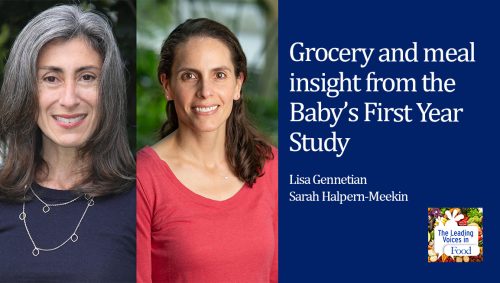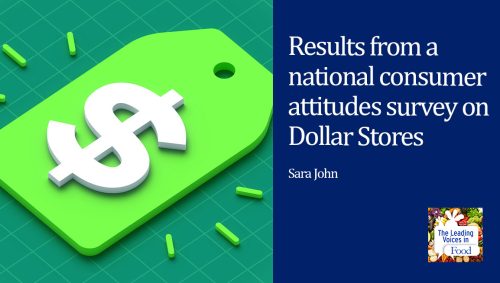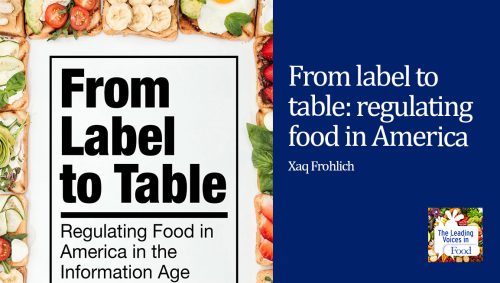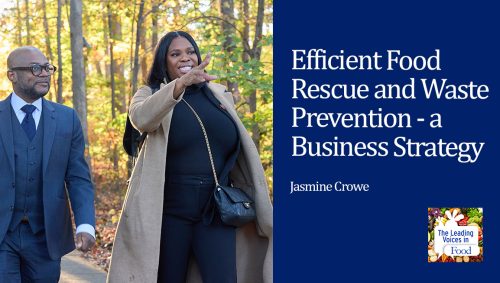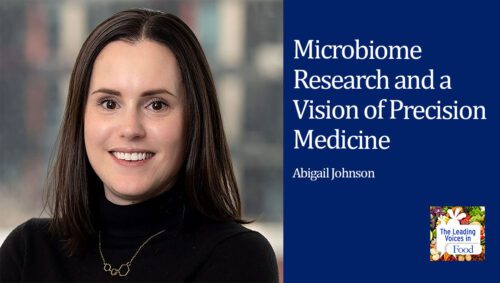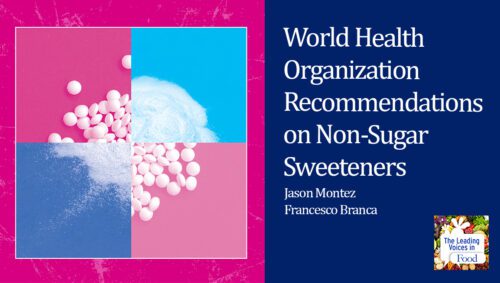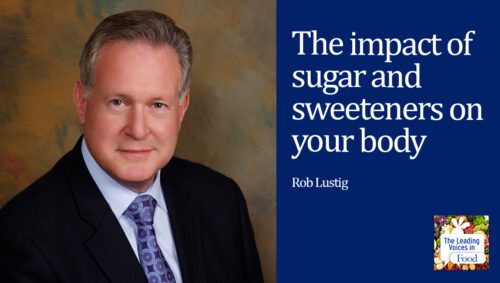The Leading Voices in Food
E202: Impact of non-caloric sweeteners on the microbiome – what we know now
With the widespread presence of artificial sweeteners in the food system, scientists and consumers want to know about their safety. Safety concerns have been expressed for years, and lots of research has been done, but relatively new on the scene is work examining the effect of sweeteners on the microbiome. This interview is part of a series on the impact of artificial sweeteners. Our guest today, Dr. Jotham Suez, is doing fascinating work on this topic. He’s Assistant Professor of Molecular Microbiology and Immunology and the Public Health Johns Hopkins University.
Subscribe: Apple Podcasts | TuneIN | Google Podcasts | SoundCloud | PocketCasts | Radio Public
Tags: Diet & Nutrition | Food Safety & Food Defense | Microbiome | Zero Calorie Sweeteners |

Dr. Jotham Suez is a Feinstone Assistant Professor at the Johns Hopkins Bloomberg School of Public Health. Dr. Suez’s work on non-nutritive sweeteners was instrumental in understanding how these popular food additives can counterintuitively disrupt glycemic control. During his graduate work at the Weizmann Institute, he demonstrated that sweeteners are not inert and can alter the gut microbiome, and causally linked those impacts to impaired glucose tolerance. He further showed that in humans, the microbiome mediates individualized responses to sweeteners, potentially underlying the conflicting literature on their impacts. Similarly, Dr. Suez’s research on probiotics offers an opportunity to resolve the contradictory literature on their efficacy. His work highlighted the microbiome’s importance in modulating probiotics colonization and downstream impacts. Inspired by these discoveries, Dr. Suez is fascinated by the potential of harnessing microbiome heterogeneity in precision medicine and personalized nutrition. In 2020, Dr. Suez received the NIH Director’s Early Independence Award.
Interview Summary
So most everyone knows of the microbiome, but not everybody knows exactly what it is and how it works, so I’m hoping we might start with a quick overview of the microbiome. Could you help us with that?
Sure, so I would say there are three really important things to know about the microbiome. We know that there are trillions of microbes, bacteria, and viruses living in our body. What everyone should know is that most of the systems in our body require these microbes for their proper development and proper function throughout our lifespan, so without these microbes, our immune system, and even our brain, would not develop properly, and if the microbiome is perturbed, this can lead to development of various diseases. That is the first thing. Already this implies that the microbiome is amenable to change, which is actually something that is attractive facet about the microbiome. If we know that the microbiome is involved in the pathogenesis of various diseases, then we can use that to our advantage, and we can think of way to change this microbial community to help protect us against disease, or even treat diseases in which the microbiome plays a role in the pathogenesis. The third thing that we should all think about is that the microbiome is some sort of a fingerprint. Each one of us has a unique microbial community in their body, and we can use that person-to-person difference in the microbiome on one hand, to predict disease risk. This is because some people would harbor the microbes that make them prone to diseases. We can also use that to tailor various drugs or various diets, or various therapeutics, to that community, because we would be able to say, based on your microbiome, how you would respond to a certain therapy or a certain diet. Heterogeneity in the microbiome plays an important role in personalized medicine.
Thanks for helping establish how important the microbiome is, and also, how it can be affected in both positive and negative ways. So in that sense, what got you interested in the impact of artificial sweeteners on the microbiome?
Yes. I think it was the person-to-person heterogeneity, and how that can lead to differential responses to diets or therapeutics. Just like you said, there have been decades of studies on efficacy of artificial sweeteners or potential safety concerns about whether they are helping us lose weight, helping us maintain healthy blood glucose levels, or they are actually doing the opposite. The studies are really all over the place. You would see studies that support a beneficial impact and studies that demonstrate detrimental impact. We were wondering as we started this research, if it’s possible that this heterogeneity in outcomes of the studies is related to heterogeneity of the microbiome. Is it possible that some people are negatively impacted and some people are positively impacted, whether this is related to the differences in their microbiome.
That’s a fascinating area, and interesting to think that the same substance may have much different effects on people. So how have you gone about studying this yourself, and what have you found?
We started very naively. I started when I was still a PhD student. I went to the supermarket, I purchased sachets of the most common artificial sweeteners that are out there, and we added that to the drinking water of mice. We saw that mice drinking these artificial sweeteners developed glucose intolerance, meaning they had poorer response to a simple sugar, which is how you would predict or diagnose pre-diabetes or diabetes in the clinic, for humans. We were able to show for the first time that sweeteners can actually cause negative impact on the metabolic health of an animal. What was more interesting is that we saw that these sweeteners also changed the microbiome of the mice drinking the sweeteners. What we’ve done then is take the microbiome of the animals that were drinking sweetener and we transplanted these microbes into mice that don’t have any microbiome of their own. Just by giving them the microbes of mice that were drinking sweeteners, these mice also had a poorer metabolic response. We were able to show for the first time that the impact of sweeteners on the microbiome can result in a negative impact on our metabolic health. After a lot of experiments in mice, where we proved beyond any doubt that mice should not drink artificial sweeteners, we were really wondering what would be the impact on humans.
We started a study in healthy individuals, so people that are not overweight and are without diabetes. We asked them to supplement their diet for two weeks with common artificial sweeteners, so sucralose, aspartame, saccharin, or one natural non-caloric sweetener stevia, and we followed up on glucose tolerance and also on their microbiome before, during, and after the exposure to the sweetener. We saw that two sweeteners, saccharine and sucralose, had a detrimental impact on their glucose tolerance. So just during two weeks of exposure to the sweetener, they had poorer responses to glucose. That would already put them on the path to potentially developing pre-diabetes and diabetes. We saw that all four sweeteners altered the microbiome. Again, when we took microbiomes of these people and transplanted them into germ-free mice we saw that the stronger the impact the sweetener had on your microbiome – that means that you would have a poorer metabolic response when you transplant these microbiomes into mice. This was really showing that there are person-to-person differences in the responses to sweeteners, and this depends on how much a microbiome is impacted by the sweetener.
That was amazing summary in a short time of really complex and fascinating science. It’s interesting that some sweeteners are having a stronger effect than others, which I guess makes more sense, because they’re not all chemically alike. Is it possible to know when you get an effect on something like glucose tolerance from the use of the sweeteners, whether the microbiome is the main mechanism, the only mechanism? How does it fit in there when you start thinking about the impact of sweeteners on something like the glucose tolerance?
That is a really great question, and I think the short answer would be that we don’t know for sure. There have been multiple other groups that have been studying the impact of sweeteners on metabolic health or other parameters related to our health that have found fascinating mechanisms that are not related, or at least, not directly related to the microbiome. So for sure, sweeteners can have a broad impact on our body, not just for their impact on the microbiome, but what we are seeing, actually, is that’s the impact that they have on the microbiome is sufficient to produce detrimental impact on metabolic health without any other measurable impacts, at least, in our studies.
Many, many people have been using these artificial sweeteners in one form or another for many, many years, and in some cases, they’re introduced into the food supply in ways that people may not even be aware of. Is there any way of knowing what happens if animals or humans have used these for a long period of time and they stop? Does whatever the impact on the microbiome reverse itself?
That’s a fascinating question. In the short term, that is something that we have measured in our studies, and others have done similar works in animal models. In a study like what we have done, which is two weeks of exposure, then one week of follow-up, you see some reversion of the microbiome to what it was before the exposure to the sweetener. But we should say that these individuals were recruited to the study precisely because they’re habitually not drinking artificial sweeteners, so their body saw sweeteners potentially for the first time. So then if they immediately stopped after two weeks, in that scenario, we can say that the microbiome reverts. What happens after years of exposure to sweeteners, that’s a study that we’re definitely interested in doing, or I would be really happy to see the results if some is already doing such a study, but I am not aware of long-term studies where people just stopped taking sweeteners and then their microbiome was profiled.
My mind is sort of firing with ideas of ways to study that question, but it’s heartening to know that at least in the short term, at least some of the whatever damage is done starts to revert. That’s very good news for people who have been using these products who choose to stop them for one reason or another, there may be a benefit to the microbiome. Let me ask about children. So many parents, they’re concerned about the effect that the sweeteners might have on their children. Is anything known about this?
Yes, I think this is a good point in the conversation to talk about the various types of evidence that we have about the detrimental impact of sweeteners. If we look at associative studies, most of these studies would find some sort of association between drinking artificial sweeteners and a negative impact on weight or on diabetes risk. So the associative studies are, for sure, pointing to a negative impact, but they don’t provide evidence that the sweeteners are causing these negative impacts. So they might be a result of, you know, the changes in weight or the risk of diabetes rather than the cause. And then when you go to studies that actually provide causality, so these would be, for example, randomized controlled trials when you give the individual the sweetener then see what happens to their metabolic health, these types of studies are all over the place in terms of benefit versus risk, both in adults and in children. So unfortunately, there is no good answer to that question. There are studies that show a risk, but even studies that show a benefit.
Even if there is risk from the artificial sweetener, some people may feel that the benefit, in terms of weight control, is more important, and they might say, “Well, I’m willing to accept the risk because of the benefit,” but we’ve heard from others that whether these products actually help people control their weight is in question as well. What do you think about that topic?
Yes, so what you would do when you have all of these studies that show even opposing results, and you try to find the truth, you would do a meta-analysis. When you perform meta-analysis on specifically the question of impact on weight, you find a very modest beneficial impact on weight. And even then, the quality of the evidence for that impact are low. Even if there is a benefit, it’s very mild, and the evidence for such a benefit are not very strong. I think that’s why organizations such as the World Health Organization have recently said that this may not be the best strategy for assisting individuals to lose weight.
You mentioned that the two compounds that had the strongest effect on the microbiome were saccharin and sucralose. Is that correct?
In our study, yes.
So saccharin, I’m not sure how much that’s used in the food supply still. It may be there, but it’s been around forever. Maybe I’m wrong, but I figure that it’s been displaced by lots of newer advances. But sucralose, which I think is marketed under the brand named Splenda, is a much more recent development in the field. It’s interesting that that’s having a negative effect too. So do you think that there’s reason to believe that those two would be substances to avoid?
I would say that you would never want to make public health decisions based on one study. I would say that that goes both ways, I think. I wouldn’t advise avoiding saccharine just based on one study, and I wouldn’t say that aspartame and stevia are safe just based on one study. I would say that others have found negative impacts for aspartame and for stevia that we have not seen very strongly in our study, whereas others have found both negative and neutral, or even beneficial effects for sucralose in other studies. So I would not make recommendations based on just our own study, but considering everything that is out there, I would say that all four sweeteners that we studied, and others, including Ace K, that we have not studied in a recent human study could pose a risk for some individuals. Unfortunately, right now, we don’t have any good tools of predicting who would be those individuals, so it’s a question of whether people should take that risk or not.
Thank you for being appropriately cautious with the result, because as you said, the work is relatively recent, but why I’m really happy you’re working on this topic. So summing this all up, what do you think is most important for people to know?
I think, at this point in the research, and just recently, another group provided really interesting evidence about a different sugar substitute, erythritol, also posing a risk for cardiovascular disease, at this point in the research of artificial sweeteners and sugar substitutes, I think we cannot say that these substances are innocuous. They can pose a risk for at least some individuals, and we and others are definitely working hard on being able to help people know whether or not they are in those risk groups. But then the question is what can people do? I think what people should definitely not do is switch back to sugar. I think that if the evidence for the impact of artificial sweeteners are still something that requires further research. I think that the detrimental impacts of added caloric sugars in our diet, in our beverages, are beyond doubt linked to detrimental impacts on our metabolic health. So people should not switch back from diet soda to regular soda, that’s for sure. But we and the industry alike should find ways of reducing the intake of sweeteners, and both caloric and non-caloric sweeteners in our diet to levels that hopefully don’t pose as great a risk as what we are currently consuming.

